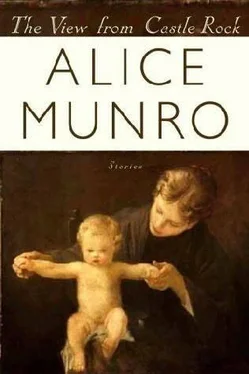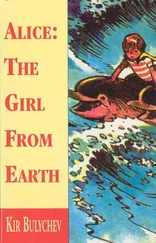The Newcombes had had five daughters, then one son. The girls’ names were April, Corinne, Gloria, Susannah, and Dahlia. I thought these names fanciful and lovely and I would have liked the daughters’ looks to match them, as if they were the daughters of an ogre in a fairy tale.
April and Corinne were gone from home some time ago, so I had no way of knowing what they looked like. Gloria and Susannah lived in town. Gloria was married and had dropped from view as married girls did. Susannah worked in the hardware store, and she was a stout girl, with slightly crossed eyes, not at all pretty, but quite normal looking (crossed eyes being a variation of normal and not a particular misfortune at that time, not a thing to be remedied, any more than dispositions were). She did not seem in any way cowed like her mother or brutal like her father. And Dahlia was a couple of years older than I was, the first of the family to go to high school. She was no wide-eyed ripply-haired beauty of an ogre’s daughter either, but she was handsome and sturdy, her hair thick and fair, her shoulders strong, her breasts firm and high. She got quite respectable marks and was good at games, particularly at basketball.
During my first few months at high school I found myself walking part of the way to school with her. She walked along the county road and over the bridge to town. I lived at the end of the half-mile road that was parallel to this road, on the river’s north side. Up to now she and I had lived our lives within shouting distance of each other, you might say, but the school districts were divided in such a way that I had always gone to the town school, while the Newcombes went to a country school farther out along the county road. The first two years that Dahlia was at high school and I was still at public school we must have walked the same route, though we would not have walked together-it was not done, high school and public school students walking together. But now that we were both going to high school we would usually meet where the roads joined, and if either of us saw the other coming we would wait.
This was how it was during my first fall at high school. Walking together did not mean that we became exactly friends. It was just that it would have seemed odd to walk singly now that we were both at the high school and going the same way. I don’t know what we talked about. I have an idea that there were long periods of silence, due to Dahlia’s senior dignity and a matter-of-factness about her that ruled out silly conversation. But I don’t recall finding these silences uncomfortable.
***
One morning she didn’t appear, and I went on. In the cloakroom at school she said to me, “I won’t be coming in that way anymore because I’m staying in town now, I’m staying at Glorias.”
And we hardly spoke together again until one day in early spring-that time I’ve been talking about, with the trees bare, but reddening, and the crows and seagulls busy and the farmers hollering to their horses. She caught up to me, as we were leaving the school. She said, “You going right home?” and I said yes, and she started to walk beside me.
I asked her if she was living at home again and she said, “Nope. Still at Gloria’s.”
When we had walked a bit farther she said, “I’m just going out there to have a look at what’s going on.”
Her way of saying this was straightforward, not confidential. But I knew that out there must mean out at her home, and that what ’ s going on, though unspecific, meant nothing good.
During the past winter Dahlia’s status in the school had risen because she was the best player on the basketball team and the team had nearly won the county championship. It gave me a feeling of distinction to be walking with her and to be receiving whatever information she felt like giving me. I can’t remember for sure, but I think that she must have started high school with all the business of her family dragging behind her. It was a small enough town so that all of us started that way, with favorable factors to live up to or some shadow to live down. But now she had been allowed, to a large extent, to slip free. The independence of spirit, the faith you have to have in your body, to become an athlete, won respect and discouraged anybody who would think of snubbing her. She was well dressed, too-she had very few clothes but those she had were quite all right, not like the matronly hand-me-downs that country girls often wore, or the homemade outfits my mother had labored at for me. I remember a red V-necked sweater often worn by her, and a pleated Royal Stewart skirt. Maybe Gloria and Susannah thought of her as the representative and pride of the family, and had pooled some of their resources to dress her.
We were out of town before she spoke again.
“I got to keep track of what my old man is up to,” she said. “He better not be beating up on Raymond.”
Raymond. That was the brother.
“Do you think he might be?” I said. I felt as if I had to pretend to know less about her family than I-and everybody-actually did.
“Yeah,” she said thoughtfully. “Yeah. He might. Raymond used to get off better than the rest of us but now he’s the only one left at home I got my doubts.”
“Did he beat you?”
I said this almost casually, trying to sound moderately interested, not in any way horrified.
She gave a snort. “Are you kidding? Before I got away the last time he tried to brain me with the shovel.”
After we had walked a bit farther, she said, “Yeah, and I just told him to come on. Come on, let’s see you kill me. Let’s see you, then you’ll get hung. But then I took off, because I thought yeah, sure, but then I wouldn’t get the satisfaction of seeing him. Hung.”
She laughed. I said encouragingly, “Do you hate him?”
“Sure I hate him,” she said, with not much more expression than if she had said that she hated sausages. “If somebody told me that he was drowning in the river I would go and stand on the bank and cheer.”
There was no way to comment about this. But I said, “What if he takes after you now?”
“He’s not going to see me. I’m just going to spy on him.”
When we came to the division of our roads she said almost cheerfully, “You want to come with me? You want to see how I do my spying?”
We walked across the bridge with our heads soberly bowed, looking through the cracks between the planks at the high-flowing river. I was full of alarm and admiration.
“I used to come out here in the winter,” she said. “I used to get right up against the kitchen windows when it was dark out. Now it stays light too late. And I used to think, he’ll see the boot marks in the snow and know there was somebody had been spying on him and that’ll drive him crazy.”
I asked whether her father had a shotgun.
“Sure,” she said. “So what if he comes out and shoots me? He shoots me and he gets hung and goes to Hell. Don’t worry-he’s not going to see us.”
Before we were in sight of the Newcombes’ buildings we climbed a bank on the opposite side of the road, where there was a thick growth of sumac bordering a planted windbreak of spruce. When Dahlia began to walk in a crouch, ahead of me, I did the same. And when she stopped I stopped.
There was the barn, and the barnyard, full of cows. I realized, once we stopped making our own noise among the branches, that we had been hearing the trampling and bawling of the cows all along. Unlike most farmsteads, the Newcombes’ did not have a lane. House and barn and barnyard were all right along the road.
There wasn’t enough fresh grass for cows to be out to pasture yet-the low places in the pastures were still mostly underwater-but they were let out of the stable to exercise before the evening milking. From behind our screen of sumac, we could look across the road and down at them as they jostled each other and blundered around in the muck, uneasy and complaining because of their full udders. Even if we snapped a branch, or spoke in normal voices, there was too much going on over there for anybody to hear us.
Читать дальше












